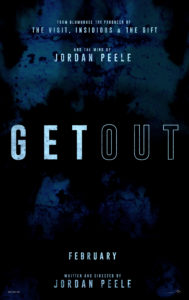Starring: Daniel Kaluuya, Allison Williams and Catherine Keener
Directed By: Jordan Peele
Rated: R
Running Time: 103 minutes
Universal Pictures
Our Score: 4 out 5 Stars
Something’s not right. It’s not just the subtle and blatant racism by Rose’s (Williams) family, but it’s the growing sense of dread that the audience experiences through the eyes of Chris (Kaluuya). Every other African-American that Chris encounters wears clothes straight out of a Norman Rockwell painting and speaks in uncomfortable pleasantries. Even worse is that when talking to these African-American’s Chris feels like he’s talking with every other white person he’s encountered at the family event.
Despite the blunt, and comedic, warnings of one of his friends, Chris is visiting the relatives of his five-month girlfriend. Rose tells him that she hasn’t mentioned she’s dating a black guy to her family, but she assures him it’s perfectly OK. She even tells him that her father (Bradley Whitford) would have voted for Obama for a third time if he could have. He later shoehorns that racially motivated banter into conversation as a way to get to know her daughter’s new boyfriend, as if her father assumes all black people voted for the 44th President. The awkward remarks and comments aren’t fooling Chris though. Something’s definitely not right.
For those familiar with Jordan Peele, who’s worked in television sketch comedy for over a decade, it might come as a surprise that his directorial debut is satirical horror, that’s a lot heavier on the tension than it is the jokes. The comedy is served up as a way to divide viewer apprehension, which there’s plenty of. Peele has a keen eye for unnerving the audience with numerous close-up shots, specific musical arrangements in even more specific spots, and performances that convey a sinister plot hidden deep in suburbia.
Peele, throughout his comedic career, has dropped muted and blunt horror movies references and “Get Out” is no different. For horror aficionados, there are plenty of nods, homages and stylistic choices reminiscent of Wes Craven, Stanley Kubrick and others. But for those in on the trick of the trade, you’ll find more to “Get Out” than its director’s love of scares as the film progresses. The social and racial commentary is sprinkled throughout and just not in Rose’s eerie, grinning family.
Chris, as well as his friend who keeps in constant contact with back home, seem to be the only ones that understand racism is still a thing. It’s seen early on with a policeman taking a statement after Rose hits a deer with her vehicle. Despite her being the driver, the officer still asks for Chris’ ID. That’s a more obvious statement by the film, but there are plenty of other moments shrouded behind smiling faces and looks, demeaning questions, and using undignified nicknames when talking with Chris.
The boogeyman in “Get Out” isn’t anything supernatural, but very real. As a white man who’s sat through plenty of horror movies, rarely do I ever get two distinct impressions. One, I am the boogeyman. Two, this is what the average black man deals with. The movie even begins with a nod to the Trayvon Martin incident as a black man walks through suburbia at night, thinking out loud about what George Zimmerman is lurking just around the corner.
As politically and socially carnivorous as “Get Out” is, it’s never victimizes black people or vilifies white people. The terror is real, projecting minority’s real world fears onto a plot revolving around body horror, brainwashing and 21st century slavery. It helps that Chris doesn’t find himself in the stereotypical backwoods, but in a picturesque homestead where everyone’s educated, nice and welcoming. But as I stated at the beginning, something’s not right. If “Get Out” is any indication, Peele is not only a refreshing voice for horror, but may have just steered the genre in a completely new direction that’s wildly exciting, scary and ferocious.


